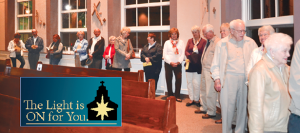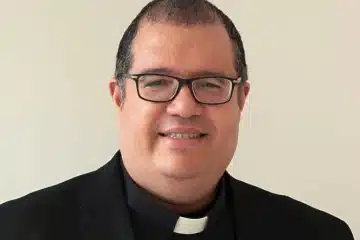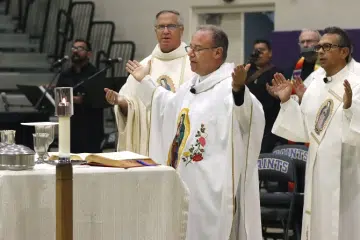The Light is ON for You: Now What? How to make a good confession

By Gail Finke
Maybe it’s been a few months. Maybe it’s been a few years. The Archdiocese of Cincinnati invites you to the sacrament of reconciliation, especially on Tuesday, March 14th from 7:00 p.m. – 9:00 p.m. For the fourth year in a row, all parishes or pastoral regions will open their doors at once for confession. Before celebrating the Sacrament of Penance, one should prepare themselves with an examination of conscience. An examination of conscience is a “prayerful self-reflection on our words and deeds in the light of the Gospel to determine how we may have sinned against God.
For a guide to Examination of Conscience as you prepare for the light is on, click here
“It’s definitely been a positive thing,” said Karen Kane, director of the Office of Divine Worship and Sacraments. “Some parishes end up open for confession all night, and each year about 90 percent of clergy say it’s worth doing again.”
Begun here in 2014 as a way to invite people who had been away from the church to come back to open doors, the event has fulfilled its promise. “Priests consistently say they get people that have come back after 20 or 30 years,” said Sean Ater, director of the Office for the New Evangelization, but it’s also been popular, with people who go regularly for the Sacrament, as well as with churchgoers who eschew confession during regular parish hours, or at one of the communal Penance services most parishes offer before Easter.
“It’s a non-threatening environment,” Kane said, noting that some parishes welcome comers with greeters and contemplative music. Some people hearing about the event, Ater said, have driven from Northern Kentucky to participate.
It’s every adult Catholic’s responsibility to confess grave sins at least once a year. Because Lent is devoted to penitence, many Catholics traditionally “make their Easter duty” and confess then. While it’s good for the soul to confess all sins, only some sins require the sacrament of penance to be absolved. According to the Catechism, they are the so-called “mortal” sins — sins that are not only grave in nature, but also that a person commits on purpose, and with full knowledge of their gravity.
Some parishes offer confession in a traditional confessional, where decorative screen separates the penitent from the priest; some face to face in a little office or room; and some offer both. While frequent confession was once common, in many parishes it nearly vanished for a while, except among people who practiced what’s called “devotional penance” – regularly examining their consciences and confessing month or even every week. But recently, many diocese have found that crowds come out for the sacrament when it’s offered as part of a special event.
“Almost every parish here has a penance service,” Ater said. “When parishes combine in pastoral regions, who hosts the penance service is a big deal. Each parish wants to host it.”
Long lines for confession at gatherings and conferences are also common. “The number one thing mentioned on the survey is ‘thanks for confessions.’” Said Jackie Keiser, one of the organizers of the past two Greater Cincinnati Catholic Women’s Conferences. “We scheduled three priests per hour the first year, for more than six hours, and there was a line the whole time. The next year we scheduled six priests per hour in the morning and three per hour after lunch. They were kept busy.”
Two priests at parishes known for long confession lines, Dominican Father André-Joseph LaCasse from St. Gertrude Parish in Madeira (which offers confession three times a week, with several priests available each time) and Jesuit Father Matthew Gamber from St. Xavier Parish downtown (where confession lines during weekday noon Mass often last past Mass itself) offer the following tips for making a good confession.
“Most people try really hard to prepare ahead of time and make a good examination of conscience,” said Father LaCasse. People who don’t know how to begin, he said, can find many online resources. “Sit down and pray about it. Make a list. A lot of people keep journals and make an examination of conscience that way. They can bring it and just pull it out.”
Some people, he cautioned, use confession as a counseling service or for spiritual direction, but that’s not its purpose. “Priests are very open to that when people need it” he said, but to be courteous to other penitents who are waiting, they should call and make an appointment with a priest for anything but confessing specific sins.
A common problem, Father LaCasse said, is separating feelings from sins. “A lot of people think their feelings are sins. They say: I feel guilty, I feel discouraged, I feel angry, I feel like I can’t forgive. Those are not objective sins! Feelings come and go, they are part of the human condition.
“It’s when you do something about those feelings — when you gossip, when you hurt somebody, when you plot against someone — that it’s an objective sin against God. We live in a feelings-oriented society. It can be a big relief to people to make the distinction clear in their minds.”
One feeling that is important, said Father Gamber, is sorrow for your sins. “Pay attention to your thoughts and feelings in your prayer, and come to a sense of sorrow,” he said, advising penitents to make a good examination of conscience starting with the ten commandments and the teachings of the church.
“There’s no perfect preparation,” he said. “Some people like to write it down. When they do, I say, We’re going to crumble up that piece of paper and treat it as a celebration. God has done all the work! He is prepared and ready. He is waiting for us.
“Just go!” advised Father Gamber. “Tell the priest you haven’t good in a long time, and the priest will help you out. That happens quite a bit. There’s nothing to be afraid of —you’ve done the hard part walking in the door. The Lord takes over, that’s why it’s a rite.
“A rite is an exercise for our senses, in this case the sense of hearing. We hear the words of absolution from the priest and experience that Jesus himself has forgiven us. Keep your ears open to the words, keep your minds open to the words, and keep your heart open to grace.”
Looking for more help? A downloadable brochure with information about how to make good confession is available from the archdiocese at LightIsOn4You.org. It includes a prayer of contrition.













